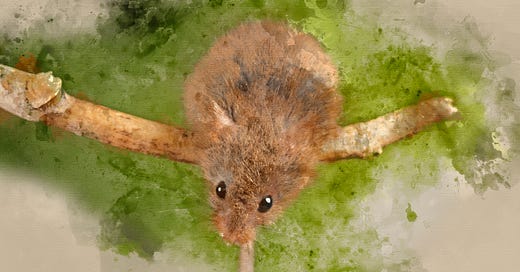"Hiro’s Festival" by Varya Kartishai
(Children's Story) A little boy who dreams of freedom has his wish fulfilled and is magically transformed.
“Short Stories For Long Discussions…”
Delight in intriguing, thought-provoking conversations about ethics, philosophy, and social issues! After Dinner Conversation is a 501(c)(3) nonprofit that publishes a monthly short fiction literary magazine.
Each issue features both established writers and up-and-coming authors who contribute fascinating philosophical insights on controversial topics like marriage equality, assisted suicide, the meaning of death, animal rights and defining your “purpose.” It’s time to go deep in search of truth!
If you love reading imaginative short stories on hot topics that make your brain think deeply but also have you laughing out loud... then this magazine is for you!
Subscribe via our website (digital or print), or via substack.
"Hiro’s Festival" by Varya Kartishai (Children’s Story)
Hiro’s father was village headman. He was the best farmer—his radishes and cabbages were enormous, his paddy produced unequaled yields of rice. Little Hiro would follow his father through the fields as he worked, stopping only to admire a dragonfly perched on a stalk or to watch a bird pecking bugs from a leaf. Every third evening the men of the village would come to the house to practice for the spring festival. His father played the flute, while his elder brother tapped the drum. Hiro would sit, fascinated, against the wall across from the irori fire, keeping time with his foot. When he grew a little bigger, he tried to copy the steps of the dance—two steps forward, one step back, two steps left, two steps right, turn and begin again. His father was pleased—one night he let Hiro dance at the end of the line—after that he would dance with the men until they left at midnight. But Hiro grew older—he had to go to the village school and spent his days learning to read instead of following his father in the fields. In the evenings he did schoolwork. When the men came to practice, the dancing felt like lessons and he no longer enjoyed it. He stretched out his schoolwork so he would not have to join the dancing. When his father noticed this he took Hiro aside to explain the tradition of the festival, which celebrated the victory of the local lord over invading pirates, and told Hiro that he and his elder brother, Toyo, must lead the festival when he became too old. Hiro was sad to have disappointed his father, but he still longed for his lost freedom. At last, his father dismissed him—Hiro bowed and turned away to go to his quilt in the corner, passing the golden carp his mother kept in a Kingyo-bachi bowl on a table by the window. He looked into its bulging eyes and heard a soft voice say, “Hiro, why are you so unhappy?” He whispered, afraid someone would laugh at him for speaking to a fish, “I would like to be free of the dancing and have time to myself again.”
“What would you do with the time?”
“Play in the fields after school, like that mouse running by the wall.”
“Would you like to change places with the mouse?”
“Yes.” Suddenly the room around him grew larger. He looked down and instead of his feet in tabi socks, he saw tiny feet covered with gray fur. Something was moving toward him—it was the family cat. Frightened, he ran into a little hole in the wall, but over his shoulder saw the cat’s face staring in. He ran deeper into the dark space between the inner and outer walls until he could no longer see the cat. Other mice were near him, but they were not playing. He asked the nearest what it was doing. It said, “Searching for food as we always do. What kind of mouse are you not to know that?” Then it sniffed and turned away. Hiro huddled in the darkness until he saw light through chinks in the wall, then managed to make his way outside. It was chilly and he was very hungry. He found some seeds to nibble, but he didn’t feel like playing. Toward sunset he got back inside the house through a chink in the wall. Then the drum began to beat. He imagined the men lining up to practice—his feet began to twitch. He peeked out to watch and found himself out on the floor moving into place at the back of the line. He began to dance, and as he danced, he grew until he was back to boy size again. His father looked at him and nodded. Afterwards, his mother served snacks of rice balls and toasted dried fish. Hiro thought he had never tasted anything so good. On the way to his quilt, he caught the eye of the fish. It seemed to say, “Did you enjoy yourself?” Hiro sadly shook his head.
Next day was a school holiday, and Hiro worked diligently to make up the lessons he had missed. He passed the fish in its bowl, and heard its soft voice say, “Being a mouse didn’t make you happy, what will you do now?” Embarrassed, he whispered, “Mice are too small to play. A cat might have a better time.”
“Would you like to change places with the cat?”
“Yes.”
Keep reading with a 7-day free trial
Subscribe to After Dinner Conversation® - Philosophy | Ethics Short Story to keep reading this post and get 7 days of free access to the full post archives.




